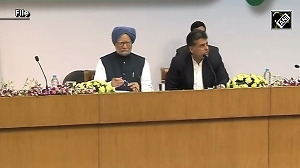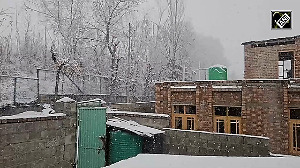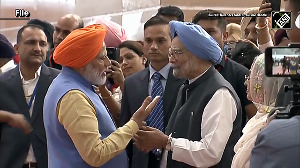This campaign casts doubts on the field marshal's real contribution to the victory, and has also given dissemination to allegations and insinuations made by Gohar Ayub Khan, former Pakistan president Field Marshal Ayub Khan's son.
Gohar Ayub Khan, who did not rise beyond the rank of captain in the Pakistan army despite his father's support because of allegations about his character, sought premature retirement in 1962 and worked as a staff officer to his father. He joined the Pakistan Muslim League and rose to be the speaker of the national assembly when Nawaz Sharif was the prime minister between 1990 and 1993.
He also served as Nawaz Sharif's foreign minister in 1997-1998. He was known to be strongly anti-India and made all sorts of baseless allegations against Indian political leaders, including Indira Gandhi, Rajiv Gandhi and P V Narasimha Rao.
Wikipedia writes of him as follows: 'His role in Karachi after his father's election in the allegedly rigged 1964 presidential elections against Fatima Jinnah is a subject of criticism by many writers. Gohar Ayub, it is said, led a victory parade right into the heartland of Opposition territory in Karachi, in a blatantly provocative move and the civil administration's failure to stop the rally led to fierce clashes between opposing groups with many locals being killed. Gohar Ayub also faced criticism during that time on questions of family corruption and cronyism through his business links with his father-in-law retired Lieutenant General Habibullah Khan Khattak. One Western commentator in 1969 estimated Gohar Ayub's personal wealth at the time at 4 million dollars, while his family's wealth was put in the range of $10-$20 million dollars.'
In 1993, he led a Pakistani delegation to a conference of the Inter-Parliamentary Union, which was held in New Delhi. During his interactions with the media on the margins of the conference he made despicable remarks about the state of India and its leaders, which embarrassed even the Nawaz Sharif government despite the strained relations between India and Pakistan at that time.
Since last year, Gohar Ayub Khan had been making insinuations that Pakistan's Inter-Services Intelligence had a spy at the level of brigadier at the Indian Army headquarters, who supplied some sensitive documents relating to the army's military plans for Rs 20,000.
All these months, he pretended to be coy about revealing the identity of this Indian officer, but in an interview telecast by the television channel on May 7, 2007, he directed
I watched the programme from the beginning to the end. It hardly looked spontaneous. It looked totally contrived and resembled a psywar exercise to discredit the Indian Army and its senior officers in the eyes of the Indian public and leaders. Not only the ISI, but even Western intelligence agencies from time to time disseminate such insinuation in carefully-crafted psywar exercises in order to achieve their nefarious objectives.
In the late 1980s, Lieutenant General Hamid Gul, who was then the ISI's director general, had claimed during an interaction with an interlocutor with close access to Rajiv Gandhi that the ISI had a mole at a senior level at the Indian Army headquarters and that through him it had obtained a photocopy of a file relating to the army's military exercise called Operation Brass Tacks.
Around the same time, the US Central Intelligence Agency had a piece of disinformation planted on Rajiv Gandhi about the threat of a possible military coup against him.
There was an inordinate delay by P V Narasimha Rao in taking a decision on the purchase of an advance jet trainer for the Indian Air Force because the British and French intelligence agencies kept planting disinformation pieces on him casting doubts about the integrity of senior Indian Air Force officers involved in the process of selection of the aircraft.
When it seemed that a French aircraft might be selected, British intelligence planted a report alleging that a senior IAF officer was a French spy and that he had once made a secret visit to France as a guest of a French aircraft manufacturing company without the Indian government's knowledge.
When it appeared that the Government of India might choose a British aircraft, French intelligence planted a report that the daughter of a senior IAF officer was living in London in a flat allegedly bought for her by the British manufacturers of the aircraft.
When Chandra Shekhar was prime minister, a story was planted casting doubts about the suitability of a senior naval officer for promotion on the ground that his daughter, who was then studying in the US, was dating a Pakistani, who it was alleged, was working for the ISI.
Planting disinformation in order to create suspicion about senior military officers in the minds of the public and political leaders is an old technique in the craft of intelligence. More often than not, foreign intelligence agencies did not succeed in the past because Indian journalists of the past did not fall into the trap.
Now, the fierce competition for viewership among television channels has made them willing to disseminate such stories for a few minutes of sensation. This is a dangerous trend, which needs to be condemned and checked.






 © 2024 Rediff.com -
© 2024 Rediff.com -